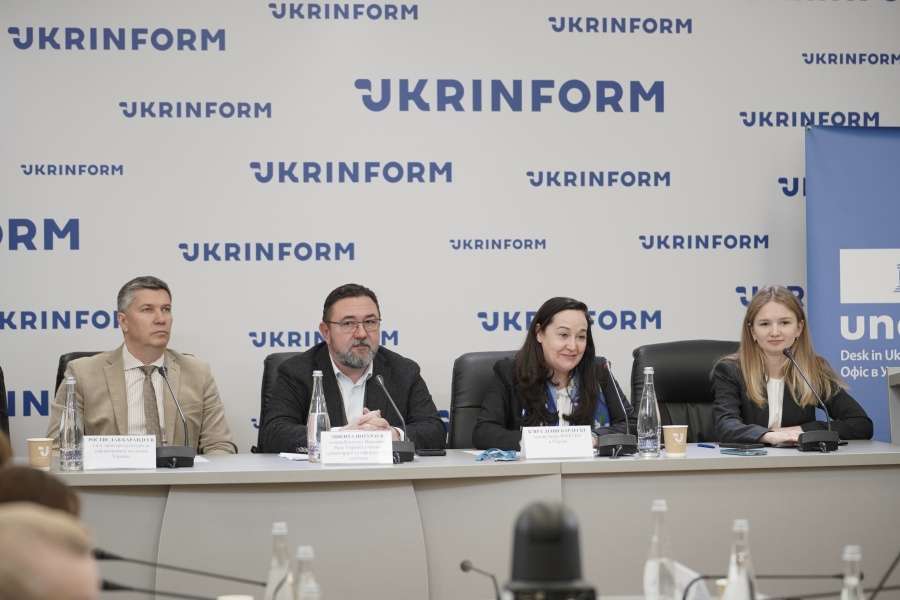This was stated by the Head of the UNESCO Office in Ukraine Chiara Dezzi Bardeschi at the expert discussion “Analysis and synchronisation of Ukrainian legislation in the field of cultural heritage protection”.
“We are all witnessing constant attacks on cultural heritage sites. As of today, UNESCO has already verified the damage to 346 cultural sites in Ukraine,” informed Chiara Bardeschi. According to the head of the UNESCO Office in Ukraine, the organisation has repeatedly officially condemned attacks on cultural heritage and reminded that under international law, the deliberate destruction of cultural sites can qualify as a war crime.
“Since the full-scale invasion of Ukraine on 24 February 2022, UNESCO has been assisting Ukrainians and Ukrainian institutions with a dual approach. On the one hand, it is the physical protection of heritage, and on the other hand, support for artists,” said Chiara Dezzi Bardeschi.
Effective legislation is a component of effective protection of cultural heritage. This was emphasised by the participants of the meeting. Ukrainian legislation in the field of cultural heritage protection lacks systematisation, has inconsistent terminology, outdated norms, and gaps that need to be addressed, in particular in the context of introducing electronic registration of cultural heritage objects and transactions with them, using the information from such registers to provide public services and other tasks. Legislation requires a high degree of systematisation of all related regulations concerning the protection of cultural heritage in its entirety.
During the discussion, UNESCO representative Chiara Bardeschi officially announced an open call for proposals “Legal analysis and systematisation of national regulations governing the protection of cultural property for harmonisation with relevant international instruments”.
The event was also addressed by the Chairman of the Committee on Humanitarian and Information Policy Mykyta Poturaiev, the Deputy Chairman of the Committee Yevheniia Kravchuk, the Acting Minister of Culture and Information Policy of Ukraine Rostyslav Karandieiev and other government officials and experts in the field of cultural heritage protection.
“We set ourselves the task of analysing all the problematic areas in our legislation in this area (ed. note: protection of cultural heritage), outlining priorities, identifying the most pressing issues to be addressed first, and, in fact, carrying out this work with the help of UNESCO,” said Mykyta Poturaiev in his opening remarks. According to the politician, there are currently problems with illegal excavations, the illegal transfer of cultural property abroad, the need to modernise museum legislation, etc.
In parallel with the research, the Committee will continue to work with existing developments, primarily the draft laws that are already in the Committee and the relevant Ministry. It is expected that within the framework of the project launched by the UNESCO Committee, draft laws developed as a result of the analysis of cultural heritage issues, expert meetings, and consultations will be submitted within one year.
The Deputy Chairperson of the Committee Yevheniia Kravchuk stressed that an important element, in addition to the adoption of the draft laws, is the ratification of conventions. “We are looking forward to submitting the Nicosia Convention to the Verkhovna Rada. This is a new convention, and it deals with offences in the field of cultural heritage,” said Yevheniia Kravchuk.
The politician pointed out that the topic of cultural heritage protection appeared in the texts of security agreements. “There is a reference to cultural heritage in our agreement with the Netherlands, and I am very pleased with this. There is also a reference to the Hague Convention, adopted in 1954, and this year marks the 70th anniversary of its adoption. In fact, the convention concerns the protection of cultural property in the event of armed conflict,” the MP added.
Representatives of the Committee, the UNESCO Office and the Ministry stressed that they are open to suggestions, and the process of updating the legislation should involve the maximum number of specialists.
